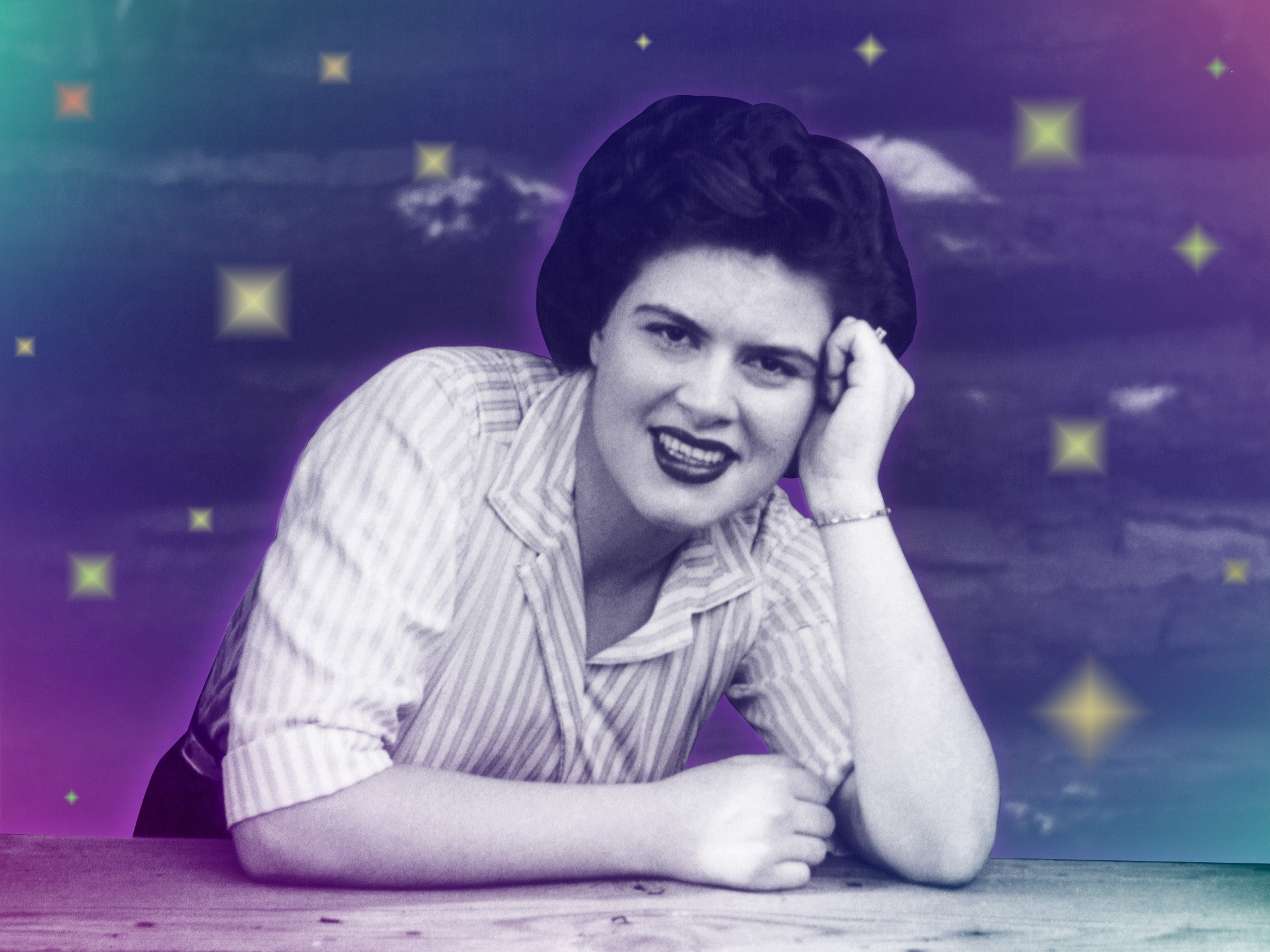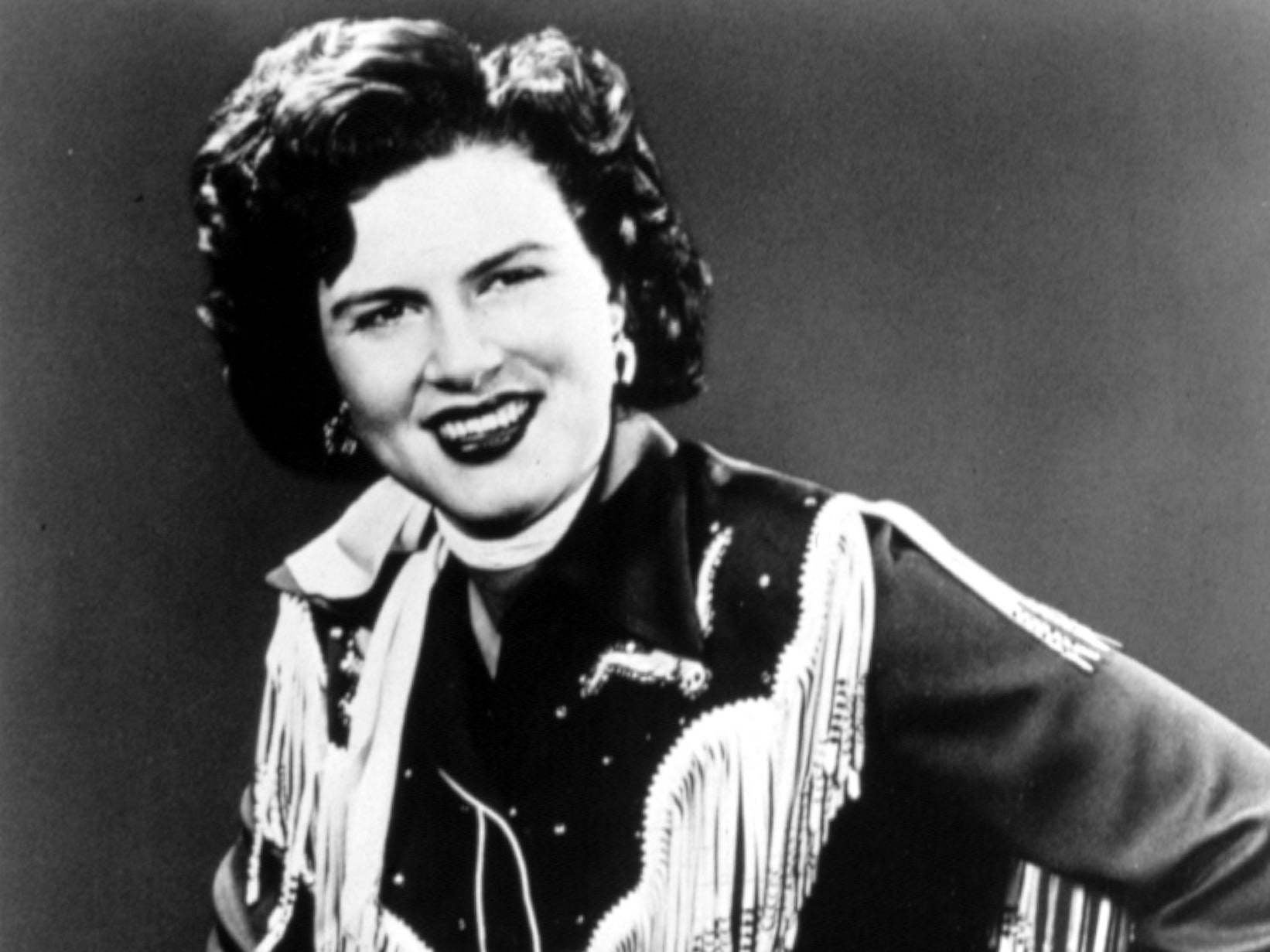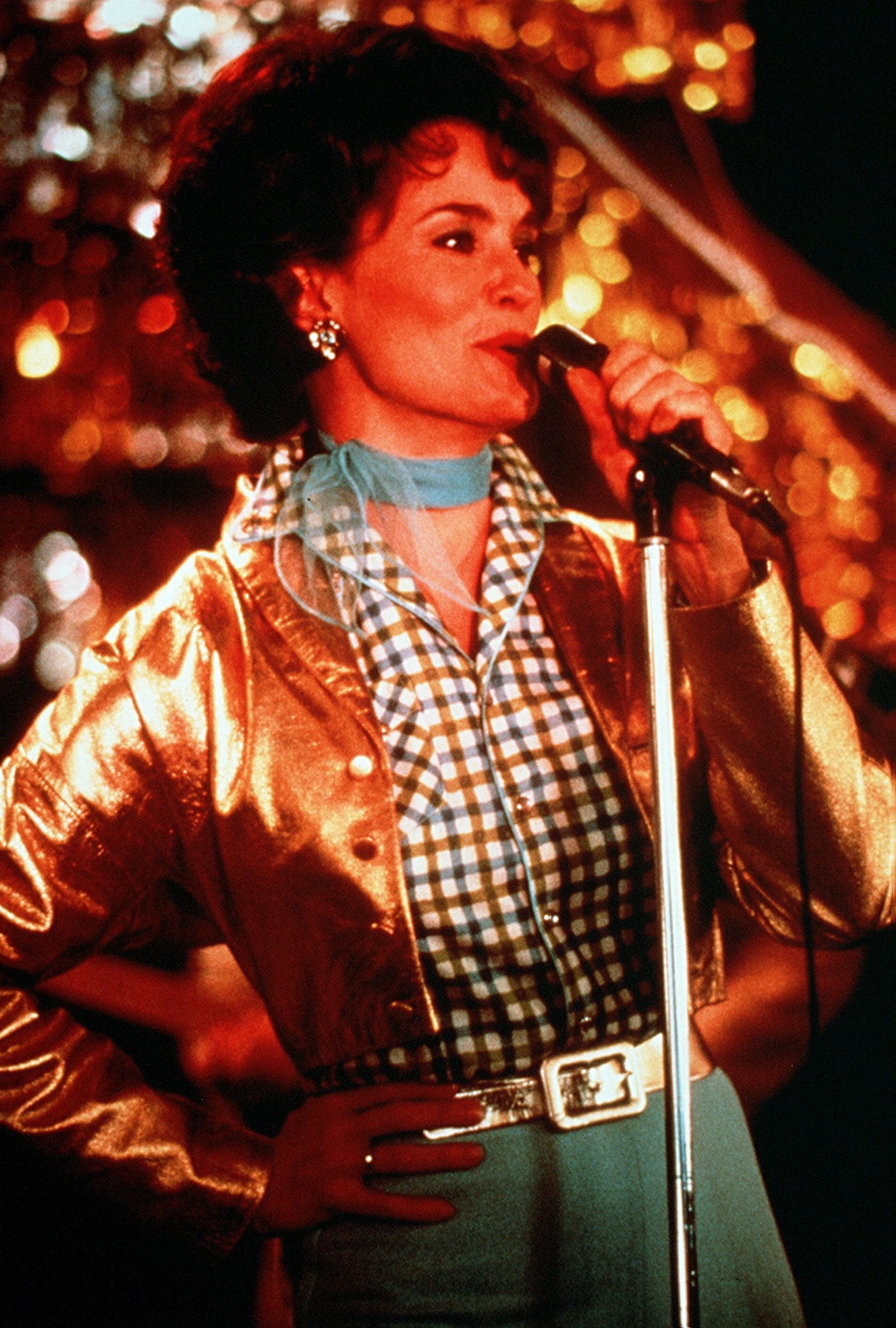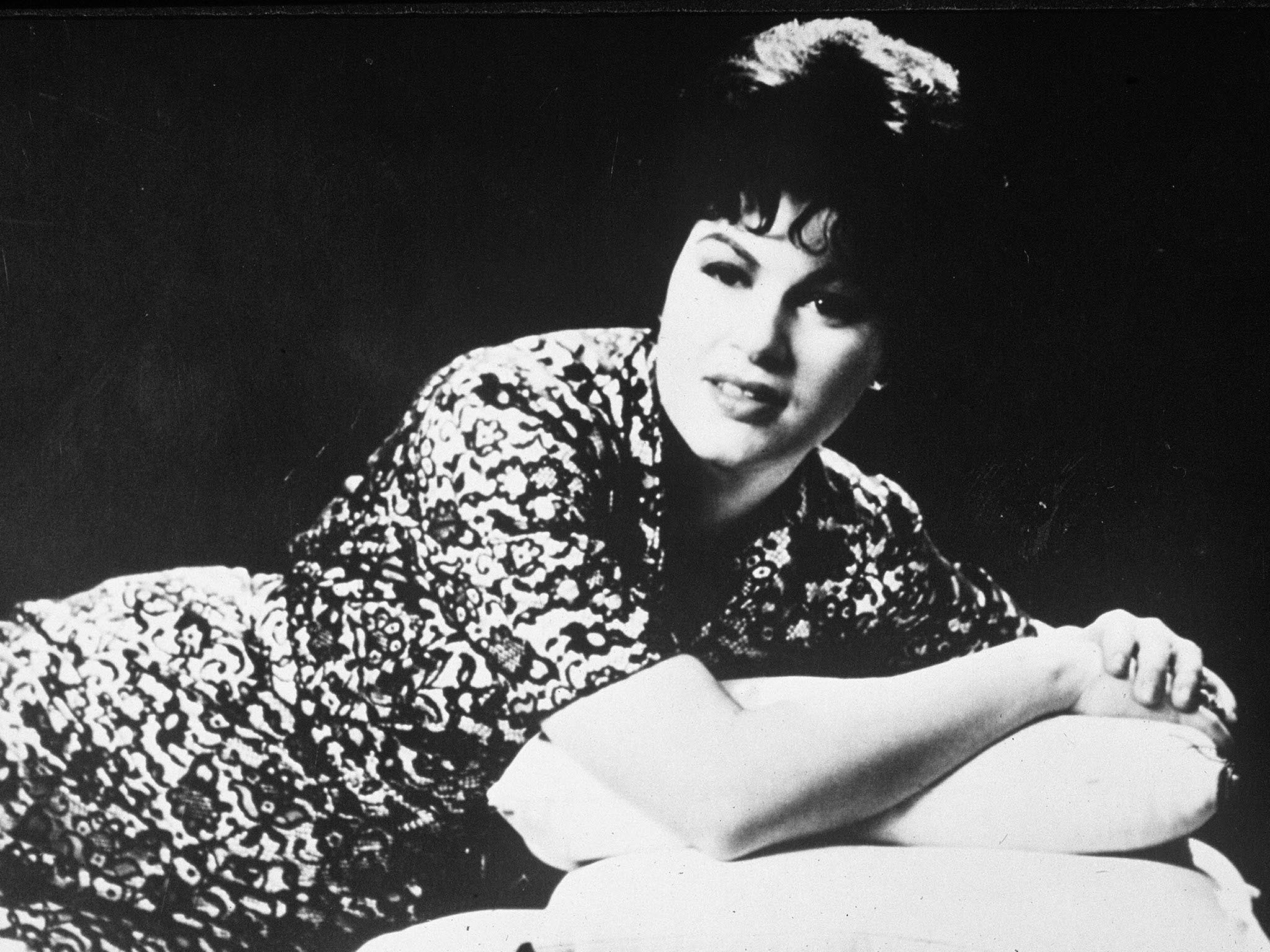Hard-working, hard-living, hard done by: How Patsy Cline epitomised the female country music star
Her death in a plane crash at the age of 30 robbed country music of one of its greatest singers. Laura Barton remembers a true original

Your support helps us to tell the story
From reproductive rights to climate change to Big Tech, The Independent is on the ground when the story is developing. Whether it's investigating the financials of Elon Musk's pro-Trump PAC or producing our latest documentary, 'The A Word', which shines a light on the American women fighting for reproductive rights, we know how important it is to parse out the facts from the messaging.
At such a critical moment in US history, we need reporters on the ground. Your donation allows us to keep sending journalists to speak to both sides of the story.
The Independent is trusted by Americans across the entire political spectrum. And unlike many other quality news outlets, we choose not to lock Americans out of our reporting and analysis with paywalls. We believe quality journalism should be available to everyone, paid for by those who can afford it.
Your support makes all the difference.Every couple of months, at a venue somewhere in Michigan – the Old Town Playhouse in Traverse City, say, or the State Theater in Bay City, the singer Judy Harrison will head backstage to her dressing room, and begin her transformation.
She fixes her make-up. She puts on a black fringed top, a black skirt, big belt and cowboy boots. Over her own long, light hair, she places the short, black wig she bought from a professional wig store in town, and runs her fingers through its faint waves.
“The wig is truly the thing that takes you there,” Harrison says via video call. “The very first time I did this, I walked out with the wig on, and I don’t know if the band knew who I was. I was so different to them, it was like they weren’t even looking at Judy.”
For four years now, Harrison has been inhabiting the lead role in a touring stage show called Remembering Patsy Cline. With her six-piece band, and three backing singer-narrators, she runs through a 90-minute, two-act performance that takes audiences from “Walking After Midnight” to “Leavin’ on Your Mind”, via “Your Cheatin’ Heart”, “Blue Moon of Kentucky” and “Crazy”. On other nights, she and her band play a country and classic rock set. “[Remembering…] is not our normal show,” says Harrison. “But it’s the one that we feel the most, of all the music we’ve done together.”
When Cline died, 60 years ago tomorrow, she was just 30 years old and at the height of her career. She had three studio albums to her name, and two No 1 singles. She had played Nashville’s Grand Ole Opry countless times, been handed the key to New York City, and become the first female country artist to headline her own show in Las Vegas. Her 1961 hit “Crazy” is said to be the most-played jukebox song of all time.
As Harrison suggests, Cline’s gift lay in the sheer amount of feeling she gave to her songs; there in each twist and tremolo of her voice, in the way it carried those lines of heartbreak, bitterness and loss. In part, this was simply a matter of talent, but it’s hard not to believe that when she sang, Cline brought some of the hardship of her own life to her music.
Cline was born Virginia Patterson Hensley in Winchester, Virginia. It was not an easy childhood – itinerant, poor, and, as she later confided to future country music great Loretta Lynn, she was sexually abused by her father. When he finally deserted the family, leaving them desperately short of money, Cline dropped out of school and took up work waitressing at a drugstore, and plucking chickens at a poultry factory.
When Cline was 13, a severe throat infection and rheumatic fever landed her in hospital, and after she recovered, she found her voice had quite changed: deeper now, and louder, something like that of Kate Smith, the contralto known as The Songbird of the South. Only now did Cline became interested in music – singing in the Baptist church choir, learning piano, and successfully auditioning for the local radio station, WINC. From here, she tried out for talent shows and developed a nightclub cabaret show.

In the early 1950s, Cline began singing with local country bandleader Bill Peer. It was Peer who encouraged her to change her stage name – she took the surname of her new husband, Gerald Cline, and adapted her middle name, Patterson, to be Patsy. Winning a local talent contest led the singer to perform as a regular on a Washington television show, Town and Country Time, and she quickly attracted praise: “She creates moods through movement of her hands and body and by the lilt of her voice,” wrote the Washington Star, “reaching way down deep in her soul to bring forth the melody. Most female country music vocalists stand motionless, sing with monotonous high-pitched nasal twang. Patsy’s come up with a throaty style, loaded with motion and E-motion.”
Enjoy unlimited access to 100 million ad-free songs and podcasts with Amazon Music
Sign up now for a 4 month free trial (3 months for non-Prime members)
Enjoy unlimited access to 100 million ad-free songs and podcasts with Amazon Music
Sign up now for a 4 month free trial (3 months for non-Prime members)
Her early years of recording yielded little – trying out a range of styles, from gospel to rockabilly for a record label contract that awarded her just 2.34 per cent of royalties. Her first single, 1955’s “A Church, A Courtroom, and Then Goodbye”, made little impression. But in 1957, her fortunes shifted with a TV talent show win – her performance of “Walkin’ After Midnight” proving so popular that Decca records rushed to release it as a single. But the success soon waned, and Cline, now a mother, and married again to a Linotype operator named Charlie Dick, relocated to Nashville in the hope of rekindling her fame.
This was the golden age of Cline’s career. With new management, a new record label, and her pick of the brightest songwriting talent, she flourished. “When she had more freedom, she really took off,” says Paul Kingsbury, managing editor at the Country Music Hall of Fame, which inducted Cline, posthumously, in 1973.
Her 1961 hit “I Fall to Pieces”, on which she was backed by The Jordanaires, also crossed over into the pop charts – showcasing, Kingsbury says, one of the singer’s great appeals: “Her voice has this wonderful tension between a pop sound and all these nice little country music touches,” he says. “She was sort of like Elvis Presley, who was a contemporary of hers, in that she managed to blend a lot of different influences for a very distinctive sound.”

It was while “I Fall to Pieces” was climbing up the charts that Cline was involved in a near-fatal car crash, leading to multiple injuries, and a month-long hospital stay. She returned to work six weeks after the collision, taking to the stage at the Grand Ole Opry. Later that same year, she recorded and released the Willie Nelson-penned “Crazy”, further establishing her as a country-music heavyweight.
Cline was on her way home to Nashville after playing a benefit show in Kansas, when her plane crashed in heavy weather just outside Camden, Tennessee. Alongside her were fellow singers Cowboy Copas and Hawkshaw Hawkins, and the pilot, her manager, Randy Hughes. The country music scene was left in shock, and thousands of mourners attended her funeral. “In the public mind, Patsy is forever young,” notes Kingsbury. “She was at what feels like the peak. But who knows how much more she could have done if she hadn’t died?”
When Judy Harrison looks out from the stage, she sees an audience that is largely female, and largely older, but most nights she will spot some younger fans, too. Recently, an 11-year-old girl came up to her after the show to tell her that her favourite song was Cline’s recording of “Come On In (And Make Yourself at Home)”.
Cline’s influence began long before her death. It was there in the work of her contemporaries, Dottie West and Jan Howard, and most particularly, Loretta Lynn, whom Cline took under her wing. Lynn would often cover the songs Cline made famous, and later wrote a tribute to their friendship, “Me & Patsy, Kickin’ Up Dust”. The 1980 biopic of Lynn’s life, Coal Miner’s Daughter, also prompted a new surge in interest in Cline’s work, as did the later Cline biopic, Sweet Dreams, starring Jessica Lange.

For six decades her legacy has continued. Kingsbury points to the singer’s influence on artists such as Linda Ronstadt, Wynonna Judd, Mandy Barnett, and Reba McEntire – who would often close her set with a number made famous by Cline. “And then there are newer country singers – Trisha Yearwood, Carly Pearce, Ashley McBryde,” he says. To those we might add LeAnn Rimes, Lucinda Williams, Kacey Musgraves, kd lang, Laura Cantrell, Brandi Carlile and Angel Olsen, all of whom have covered or paid tribute to Cline.
The Canadian-born, New Zealand-based Tami Neilson is a multi-award-winning country singer, whose work has often drawn comparisons to Patsy Cline. Growing up a member of a family band, and having shared a stage with Kitty Wells by the age of 10, Neilson was well-steeped in country. She found Cline’s music via her early love for Loretta Lynn, and through her father’s encouragement to sing her numbers at shows.
You look at the statistics, and only 13 per cent of country music radio was made up of female artists in 2022
“My dad was like, ‘Oh, audiences would love it if you did a Patsy song,” she remembers. “As I was singing her songs for audiences, I realised how challenging they are, the jumps and range. Yet she always looked and sounded so effortless when she sang.” Neilson recalls watching a clip of Cline singing Hank Williams’s “Lovesick Blues” live on television. “And there’s no reverb on the mic, it’s dry as a bone. Anyone else would sound like absolute crap. And she just sings it, and she’s snapping and looking around like she could be doing her grocery list in her head. She’s that effortless. And then in the very last note she breaks into another octave higher and it’s like a yodel.” Across the screen, Neilson attempts the same vocal manoeuvre. “It’s such a high note,” she laughs. “And for Patsy, it’s like water off a duck’s back.”
Kingsbury also cites this performance as one of Cline’s finest. “I think you can hear in so many of her performances that she was almost a method actress,” he says. “And in her very best pieces, she could really pour herself into a song, and really embody the emotion of it. I think you are hearing some of what in part she was – gritty, and yet she had this beautiful angelic tone. You can hear both of those things.”
Certainly, Cline’s life required some grit. Aside from her early hardships, her relationship with her second husband, Dick, was tempestuous and sometimes violent. Once asked if he had been physically abusive towards his wife, Dick told a reporter: “I might have hit her a couple of times, but if I did, after the second time, she woulda picked up a chair and hit me over the head. Patsy wasn’t mean – God, there wasn’t a mean bone in her body – but you didn’t cross her.”

For Neilson, as for many, Cline’s appeal lies in her music of course, and that remarkable voice, but also a sense of who she was as a person: the tough times she had weathered, the kindness she showed to her fellow country performers, the fact that off-stage she would drink hard and cuss like a sailor. The way that she helped to provide the template for the female country star – hard-working, hard-living, hard done by, imbued with talent and a heart of gold.
It’s a sorry state of affairs, she says, that long after Cline’s passing, the country music world should remain so inhospitable to women. “You look at the statistics, and only 13 per cent of country music radio was made up of female artists in 2022,” she says. “How can that be in this day and age? It’s really a heartbreaking thing. I’ve been doing country music my whole life. I love it with all my heart. But it’s almost like a toxic relationship where it will never love you back.” Little wonder, she says, that so many female country stars, including Musgraves and Carlile, have now veered towards pop music. “Do you blame them?”
For a time, Neilson thought her last album, Kingmaker, might be her last country record. Instead, it seems to have reconnected her to some of her earliest country loves – Cline among them. Its stand-out track is a duet called “Beyond the Stars”, performed with Willie Nelson. “When I sent him the song to consider doing the duet, he said that he loved it and that it reminded him of Patsy.” She beams. “I could not get a bigger compliment.”
“You know, we learn to sing from a handful of artists that we love, and that’s who we are,” she says. “They’re the artists that are on our shoulders. And Patsy is always a part of every song that I sing – there’s always at least one Patsy note in there. She’s always on my shoulder.”



Join our commenting forum
Join thought-provoking conversations, follow other Independent readers and see their replies
Comments